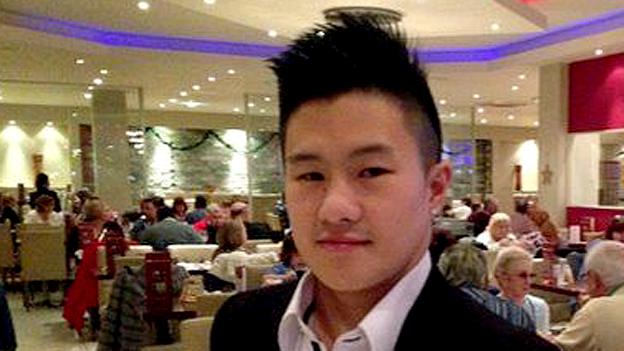British East Asian actors ‘face prejudice in theatre and TV'
- Published
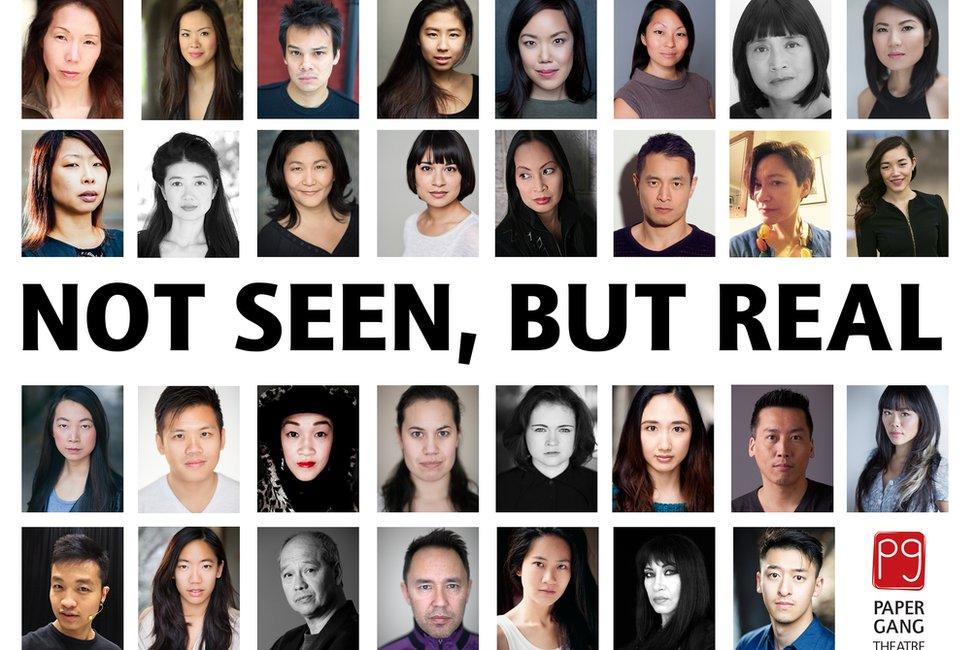
A poster of East Asian actors, used at a "Yellowface" protest in 2017
British East Asians say they still face serious prejudice when it comes to casting in theatre, TV and film, and are at risk of being seen as an "invisible" minority.
"The representation of East Asians tends to be stereotypical, or involve racist tropes (in TV and theatre)," says actress Lucy Sheen.
"Women are generally depicted as slim, petite, long-haired, submissive 'lotus blossom' types, prostitutes, or illegal immigrants, while East Asian men are portrayed as asexual or effeminate."
East Asian actors are rarely cast in non-race specific roles, and are frequently expected to put on a Chinese accent when acting, and yet many producers consider "Yellowface" - casting white actors as Chinese characters - to be acceptable, she adds.
The playwright and actress, who has acted in Call the Midwife and EastEnders, is one of several writers to be featured in a new anthology, Foreign Goods.
The book, which launches at Asia House on Thursday, is said to be the first collection of modern dramatic writing by British East Asian writers.
When white actors play other races
Katie Leung: I've yet to play non-Chinese role
Why assume an Asian woman is the nanny?
It is edited by Jingan Young, an award-winning writer who says there is "a clear dearth of East Asian stories and voices on national stages".
"Representation is important because it shapes your perceptions," she argues. "You do learn behaviours off television, art and books, especially at a young age."
'Double standard'
The sense that British East Asians are not being authentically portrayed in arts and entertainment is shared by many.
Harry Potter actress Katie Leung has previously told the BBC that tackling stereotypes is "a challenge", while Humans star Gemma Chan told The Telegraph: "You are more likely to see an alien in a Hollywood film than an Asian woman, external."
Leung and Chan were among the dozens of people who protested outside London's Print Room theatre last year, after its production of In the Depths of Dead Love, a play set in China, used an all-white cast.
Allow X content?
This article contains content provided by X. We ask for your permission before anything is loaded, as they may be using cookies and other technologies. You may want to read X’s cookie policy, external and privacy policy, external before accepting. To view this content choose ‘accept and continue’.
Dr Ashley Thorpe, a senior lecturer in drama, theatre and dance at Royal Holloway University, says there has been a "long historical discriminatory practice" against British East Asian actors.
"We're talking about the kind of practice that would be unthinkable for other ethnicities - for example, the idea of a white actor playing a black role by donning costume and make-up would be completely unthinkable."
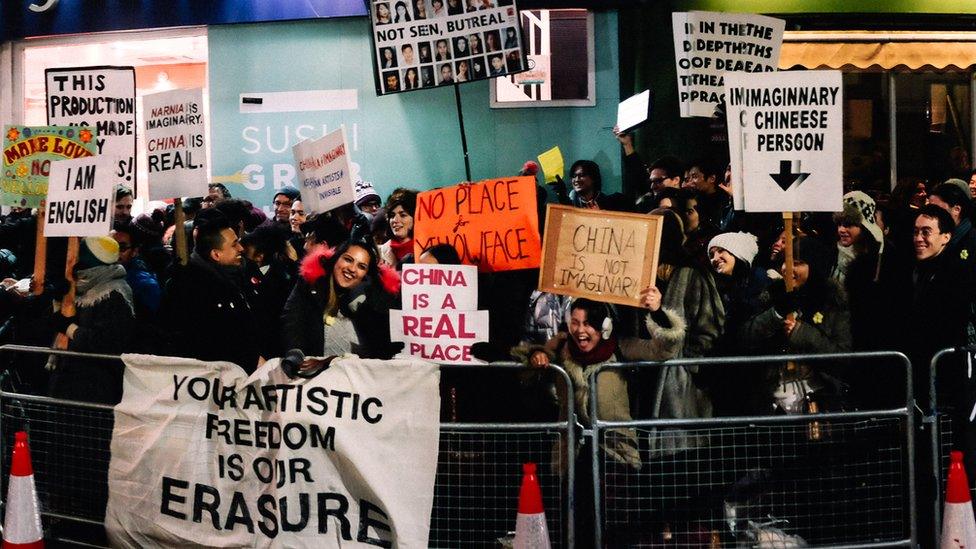
About 50 people took part in the protest outside the Print Room theatre
There is a "double standard" when it comes to East Asian representation, he says.
Companies often cite colour-blind casting or the "universality" of a play as a defence, "but at the same time, British East Asian actors aren't being incorporated into other areas".
"There's a sense that they are only allowed to play themselves in a certain kind of way - often involving Pidgin English or being an immigrant."
Turning point?
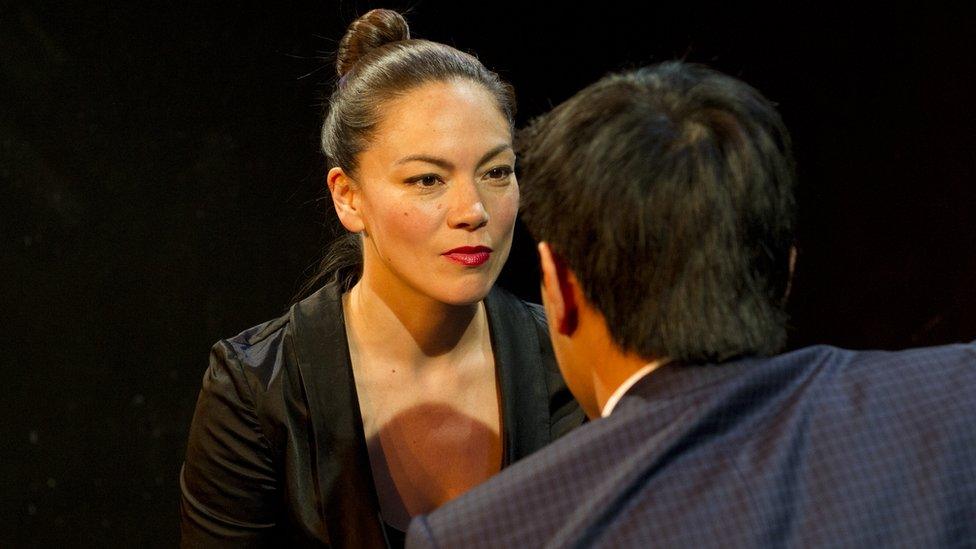
A scene from Jingan Young's play Your Only Right is to Obey
There are no clear statistics on the opportunities available to British East Asians, or how they are represented. It's a source of frustration for Dr Thorpe, who says he has applied for funding to conduct studies in this area "numerous times", but been "told it's not a priority".
However, he cites several recent theatre productions as examples:
2009 - Arcola Theatre's production of More Light, about concubines trapped in the tomb of China's first emperor, was performed by an all-white cast, with actresses wearing kimonos and oriental-style make up.
2012 - The RSC production of the Orphan of Zhao, known as "the Chinese Hamlet", sparked controversy after only three East Asian actors were cast in an ensemble of 17 - as dogs and a maid. Following criticism, the RSC said it had auditioned many East Asian actors and recognised that "the lack of visibility for East Asian actors is a live and very serious issue".
2017 - The Print Room theatre's production of In the Depths of Dead Love, a drama set in ancient China, used an all-white cast. Dozens protested outside the theatre, accusing it of "Yellowface". The theatre apologised for any offence caused, but said it was "a very 'English play' [that] simply references the mythic and the ancient".
2017 - Music Theatre Wales' production of The Golden Dragon, a modern opera set in an Asian-style restaurant about an illegal Chinese immigrant, featured an all-white cast. A London venue cancelled plans to show the opera, and Music Theatre Wales later said it made an "error of judgement".
TV stereotypes
Actors say the furore over Orphan of Zhao in 2012 marked a turning point in theatre.
"It increased our visibility," Daniel York, who has performed for the Royal Court, National Theatre and RSC, says, adding that the situation is "definitely improving".
In 2017, the RSC production of Snow in Midsummer, a Chinese classical drama, featured a large ensemble of east Asian actors.
And York points to a number of 2018 theatre productions involving East Asian actors and writers, including The Great Wave, Into the Numbers, and Acceptance.
However, he argues there is still a "huge" problem on TV, where East Asians tend to be depicted as "a kind of exotic other" or "thuggish brutes, dull, or stern patriarchs".
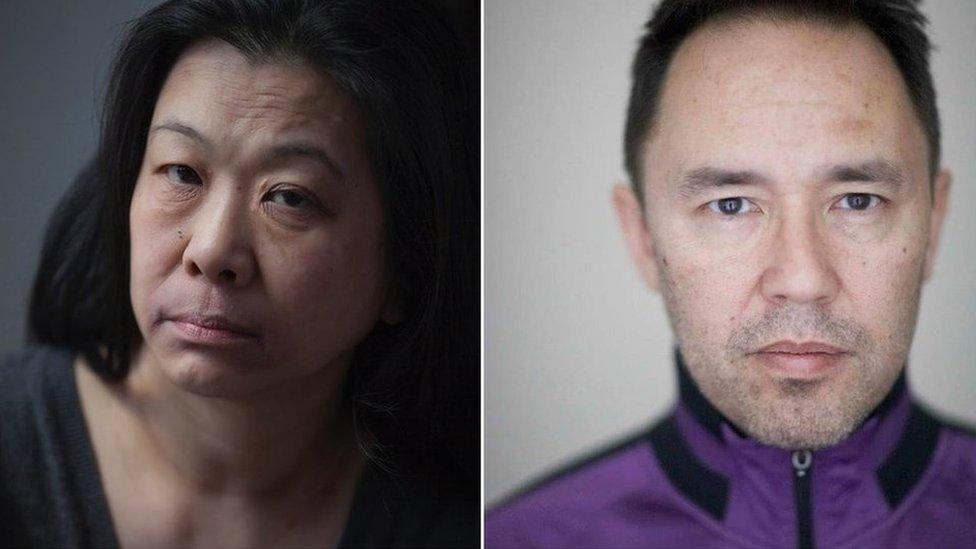
Lucy Sheen and Daniel York are among the actors calling for better representation
One episode of Sherlock featured a Chinese criminal gang disguised as a circus troupe, while Chinese Burn, a recent BBC Three commission, was accused of perpetuating stereotypes after it featured jokes about eating dogs, and sexually inept Chinese men.
Many argue that the US entertainment industry is ahead of the UK when it comes to minority representation.
Sitcom Fresh off the Boat was praised for its depiction of a Taiwanese-American family, while My Crazy Ex-Girlfriend cast an East Asian as the male romantic lead - something critics noted was unusual.
And while Hollywood films such as Ghost in the Shell and Doctor Strange have been accused of "whitewashing", observers say things are also moving in a positive direction, with the casting of a Chinese actress as Mulan, and an all-Asian cast in Crazy Rich Asians.
Is Hollywood 'whitewashing'?
Actor quits film over 'whitewashing'
Marvel star slates 'racist' Hollywood
Historical dramas 'limit UK black actors'
In the UK, Dr Thorpe argues there is less awareness of racial politics surrounding East Asians, compared to Black and South Asian groups.
"British East Asians are considered a neoliberal, multicultural success story," so people are often unaware of the racism that they do encounter, he says.
"They are characterised as being content, hard working at school, and with nothing to complain about."
But York says this is precisely why British East Asians should continue speaking up.
"We've been very good at edging ourselves out of the race and diversity debate [until now]... the trouble is, if you don't make a noise you'll get sidelined and ignored."
- Published25 July 2017
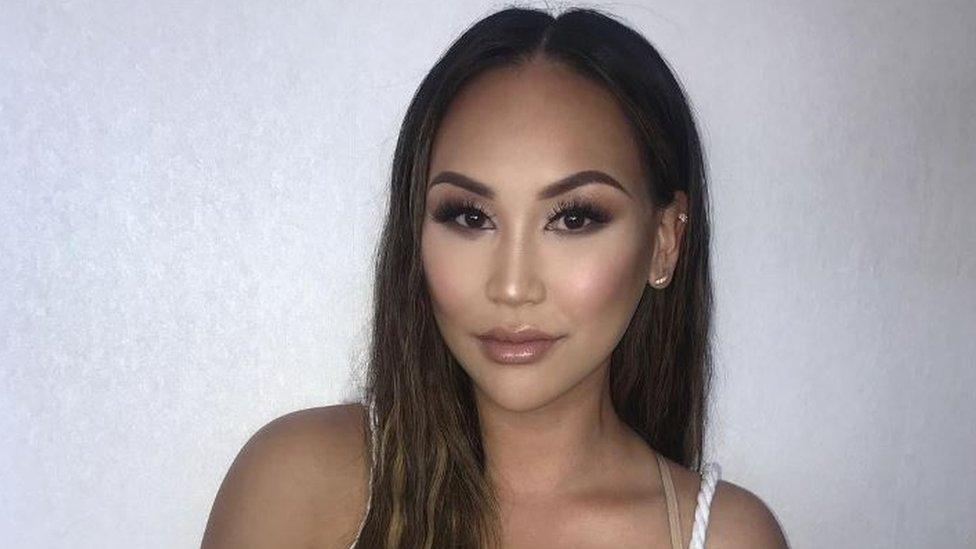
- Published17 February 2016
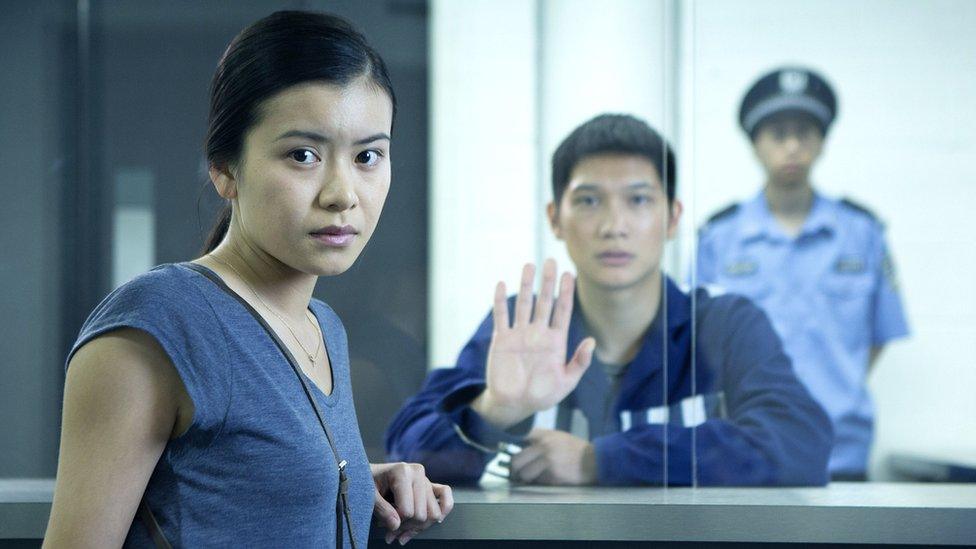
- Published6 January 2015
